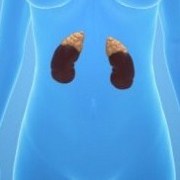 Hemera/Thinkstock
Hemera/Thinkstock
Autoimmune disease strikes women in 75 percent of cases, according to the American Autoimmune Diseases Association (AARDA). One of the less common types is Addison's disease.
In this condition, the adrenal glands do not produce enough of the hormone cortisol. Other hormones, including aldosterone, may also be reduced.
General symptoms include weight loss, weakness, fatigue, low blood pressure, and darkening of the skin. About 70 percent of Addison's cases are autoimmune, according to AARDA.
Medline Plus, a service of the U. S. National Library of Medicine, lists other causes as infection, hemorrhage, tumors, and anticoagulant drugs.
Women with Addison's disease have difficulties in pregnancy. Sigridur Bjornsdottir and colleagues at the Karolinska Institutet in Sweden reported that female Addison's patients have fewer children overall, and higher rates of preterm birth, low birth weight infants, and cesarean deliveries. The study included 1,188 women with a diagnosis of autoimmune Addison's disease and 11,879 matched controls.
Sexual function, however, was not affected in a similar study by Martina M. Erichsen and colleagues at Haukeland University Hospital in Norway. Erichsen also found that female Addison's patients have fewer children, but these subjects reported sexual activity equal to that of controls.
A Polish study of 13 women and 2 men with Addison's disease found emotional symptoms to be important. Izabela Warmuz-Stangierska and colleagues reported that patients have increased levels of anxiety or fear, over-reaction to stimuli, and decreased performance efficiency.
Standard treatment, according to Medline Plus, is hormone replacement therapy with corticosteroids. Warmuz-Stangierska recommended psychological support also.
Johanna Klement and colleagues at Ratzeburger Allee in Germany found that “comfort food” can be valuable as well. These authors explained that fatigue, faintness, lack of concentration, and memory deficits are characteristic of patients with neuroglycopenia, that is, not enough glucose in the brain. Ten Addison's patients with these symptoms felt better after consuming high-calorie, glucose-rich food.
The comfort food buffet offered “potato chips, peanuts, chocolate, muffins, wine gums, custard, bread rolls, brown bread, cheese, smoked salmon, meat salad, cream cheese, butter, chocolaty hazelnut spread, meatballs, lemonade, drinking chocolate, orange juice, condensed milk, sugar, fruit tea, coffee (decaffeinated), and water.”
For comparison, the subjects were offered green salad with low-calorie dressing and water at another time. Addison's disease patients showed improvement after the comfort food buffet but not the salad. Healthy control subjects did not show this effect.
References:
American Autoimmune Diseases Association. Web. Feb. 24, 2012.
http://www.aarda.org/women_and_autoimmunity.php
Medline Plus. Web. Feb. 24, 2012.
http://www.nlm.nih.gov/medlineplus/ency/article/000378.htm
Bjornsdottir S et al, “Addison's disease in women is a risk factor for an adverse pregnancy outcome”, J Clin Endocrinol Metab. 2010 Dec; 95(12): 5249-57. http://www.ncbi.nlm.nih.gov/pubmed/20861125
Erichsen MM et al, “Sexuality and fertility in women with Addison's disease”, J Clin Endocrinol Metab. 2010 Sep; 95(9): 4354-60. http://www.ncbi.nlm.nih.gov/pubmed/20610594
Warmuz-Stangierska I et al, “Emotions and features of temperament in patients with Addison's disease”, Endokrynol Pol. 2010 Jan-Feb; 61(1): 90-2. http://www.ncbi.nlm.nih.gov/pubmed/20205110
Klement J et al, “High-calorie glucose-rich food attenuates neuroglycopenic symptoms in patients with Addison's disease”, J Clin Endocrinol Metab. 2010 Feb; 95(2): 522-8.
http://www.ncbi.nlm.nih.gov/pubmed/19965917
Reviewed April 2, 2012
by Michele Blacksberg RN
Edited by Jody Smith




Add a CommentComments
There are no comments yet. Be the first one and get the conversation started!